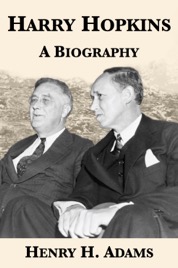 $9.99 on Kindle, Nook, Apple Books, Kobo, Google Play
$9.99 on Kindle, Nook, Apple Books, Kobo, Google Play(cover by Susan Erony)
Harry Hopkins: A Biography by Henry H. Adams (with a foreword by W. Averell Harriman; 181,000 words, 40 illustrations)
Born in Iowa, Harry Lloyd Hopkins (1890-1946) graduated from Grinnell College and took a job at Christadora House, a social settlement house, in New York City where he later worked in the Bureau of Child Welfare and the New York Temporary Emergency Relief Administration (TERA), before President Roosevelt asked him to run the Federal Emergency Relief Administration (FERA), the Civil Works Administration, and the Works Progress Administration (WPA), which he built into the largest employer in the US.
Hopkins was Secretary of Commerce from 1938 until 1940. From 1940 until 1943, he lived and worked in the White House. He enjoyed close relationships with FDR and with Eleanor Roosevelt. During World War II, he oversaw the $50 billion Lend-Lease program of military aid to the Allies and, as FDR’s personal envoy to Churchill and Stalin, had a key role in shaping Allied military strategy. Hopkins was considered a potential successor to FDR as President until the late 1930s, when his health began to decline due to a long-running battle with stomach cancer. He died at the age of 55.
“The author is the first since Robert Sherwood... to complete a full biography of Harry Hopkins. He has added significant detail, based on new sources, while confirming Sherwood’s portrait of a brave and loyal aide who ranked with George Marshall in his contribution to victory in World War II. The three most influential foreign policy advisers to Presidents in this century were Colonel House for Wilson, Hopkins, and Henry A. Kissinger. Hopkins was more loyal than House, less innovative than Kissinger, but equal to both in his ability to get things done. He died in 1946, exhausted and in debt.” — Gaddis Smith, Foreign Affairs
“[A] fascinating, well-written book... Hopkins’s influence on national social welfare policy developments lasted only a relatively short time, from 1932 to 1938 when he was appointed Secretary of Commerce. Then the events that were to lead to World War II were shaping up, and Roosevelt chose Hopkins to serve as his personal ambassador. That part of the story is completely absorbing, and the reader will find it well worth his time as general history and intimate biography.” — F. R. B., Social Service Review
“This first detailed biography of Harry Hopkins is essential reading to one interested in the domestic and foreign policies of Franklin Roosevelt. Hopkins was closer and had a greater impact on Roosevelt during his presidency than any other single individual. The book is well-written, interesting, and thoroughly documented... [Hopkins’] role as head of the Works Progress Administration is skillfully outlined. The importance of his work during World War II in acting as Roosevelt’s liaison with both Churchill and Stalin cannot be underestimated... Despite the obviously important matters of substance in which Hopkins was involved, the book does not neglect his personal life, domestic problems, and poor health. He comes through it all as a very interesting individual with whom one would have enjoyed working.” — Victor B. Levit, American Bar Association Journal



